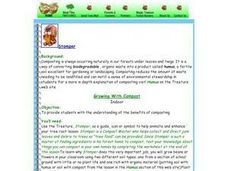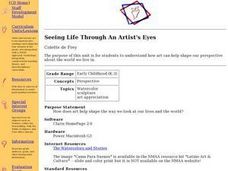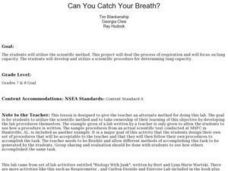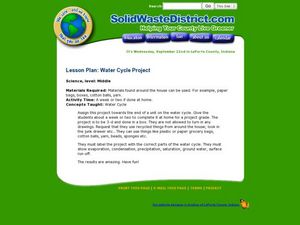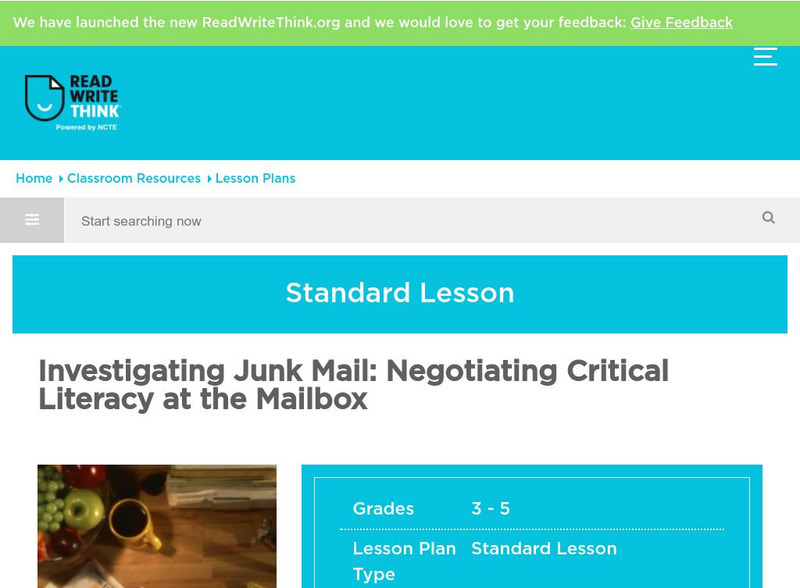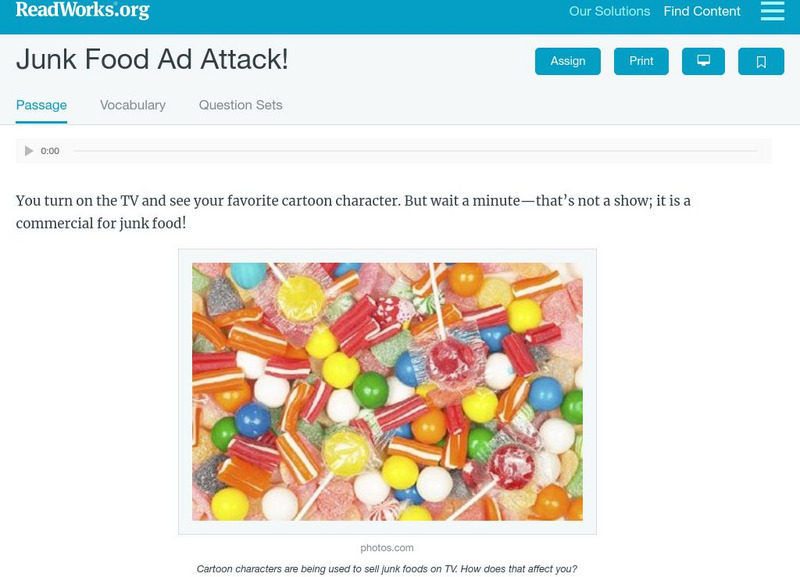Curated OER
Growing With Compost
Learners discuss the positives and negatives of composting. They plant their own plant using composting material and record results. They create a poster for the classroom.
Curated OER
Seeing Life Through An Artist's Eyes
Students examine how art can change the way they look at their lives. After being read a book, they discuss the importance of art in their world and what would happen if it were taken away. They create a watercolor painting and shares...
Curated OER
Where Do I Fit In The Food Pyramid?
Students discuss how their daily diets fit into the dietary guidelines set out by the food pyramid. They write a paragraph describing good health habits and identify areas where their personal diet can be improved.
Curated OER
Why do we need Vitamin C in our diet? Or Why do we carry old inactive genes in our genome?
Students explore and explain how mutations in the DNA sequence of a gene may be silent or result in phenotypic change in an organism and in its offspring. They analyze how evolution and biodiversity are the result of genetic changes that...
Curated OER
Don't Punch Too Hard
Students recognize the short vowel u in written and spoken language. Through matching and listening activities, they discriminate the vowel sound /u/ from other phonemes. Students identify the phoneme and letter in words and pictures.
Curated OER
Lucky Ducky
First graders recognize the short vowel u in written and spoken language. Through matching and listening activities, they discriminate the short vowel /u/ from other phonemes. Students associate the phoneme with its letter representation...
Curated OER
How Does Climate Affect Our Shelter Needs?
Fourth graders investigate how weather influences shelter choices. They explore the concept of insulation and discuss some traditional Native American shelters. They discuss the shelters used by the Okanogan people during the various...
Curated OER
Can You Catch Your Breath?
Students apply the the scientific method to an investigation.They develop and perform a scientific procedure for determining lung capacity. In addition, they write a report to display information and share their procedures with the class.
Curated OER
Elements of Music
Students identify three of the essential elements of music: rhythm, melody and harmony. They discover a simple song which will illustrate these three elements separately and bring them together in a final form. They analyze and critique...
Curated OER
Moses
First graders become acquainted with the concept of honesty. A lecture is presented to the students detailing Moses' life and his involvement in presented the Ten Commandments to the people. After the lecture is completed, 1st graders...
Curated OER
Food Pyramid
Second graders are introduced to the food groups on the food pyramid. Individually, they draw pictures of their favorite foods and identify which food group it belongs. To end the lesson, they discuss the importance of eating a variety...
Curated OER
Trash To Treasure
In this environmental worksheet, students learn about reusing trash and making crafts and useful items instead of throwing it into a landfill. Students study 15 pictures of crafts and list as many trash items as they can find.
Curated OER
Discuss Ethical Issues 2
In this language arts instructional activity, students practice oral discussion skills by participating in a group or partner activity. Students choose one of 15 ethical questions and discuss it. Note: Some subjects are most suitable for...
Curated OER
The Old House
In this ESL conversation worksheet, students read a report on the condition of an old house that needs repairing. In small groups or in partners, students discuss what needs to be done to repair the house.
Curated OER
Using Different Types of Sentences
In this types of sentences instructional activity, students use a variety of sentences to make their writing interesting. Students complete three activities to help them with different sentences.
Curated OER
Our Family
Students explore the family unit. In this family lesson, students read books about families and identify the role of each family member. Students create a family album and share their finished album with the class.
Curated OER
Alphabetizing Words Beginning with I and J
Students demonstrate how to alphabetize words. In this word study lesson, students are introduced to putting words into alphabetical order. Students complete a worksheet, specifically addressing how to alphabetize words that begin with I...
Curated OER
Compost Tag
Students identify biodegradable items. In this environmental instructional activity, students participate in a game of tag. A student's name is called out along with a biodegradable item and the student is tossed a ball.
Curated OER
Water Cycle Project
Students complete a water cycle project. In this Earth science lesson, students use recycled objects from around their homes to illustrate the water cycle. Students illustrate evaporation, condensation, precipitation, saturation, ground...
Curated OER
Ocean Pollution
Students study their role in eliminating ocean pollution and helping keep the oceans clean. In this environmental issues lesson, students define pollution and brainstorm examples of ocean pollution. Students define biodegradable and...
Curated OER
ESL Activity: Mixed Re-phrasings
In this ESL re-phrasing learning exercise, students rewrite a set of sentences to make the new ones mean the same as the originals, 30 total.
ReadWriteThink
Read Write Think: Junk Mail: Negotiating Critical Literacy at the Mailbox
Contains plans for three lessons that teach young scholars to examine junk mail critically. In addition to objectives and standards, this instructional plan contains links to sites used in the lessons as well as assessment and reflection...
PBS
Pbs Learning Media: Healthy Snacks vs. Junk Food
Help children define and discover the differences between healthy foods and junk foods, in this activity from Arthur: "D.W. the Picky Eater."
Read Works
Read Works: Junk Food Ad Attack!
[Free Registration/Login Required] An informational text about companies marketing junk food to children. A question sheet is available to help students build skills in reading comprehension.


